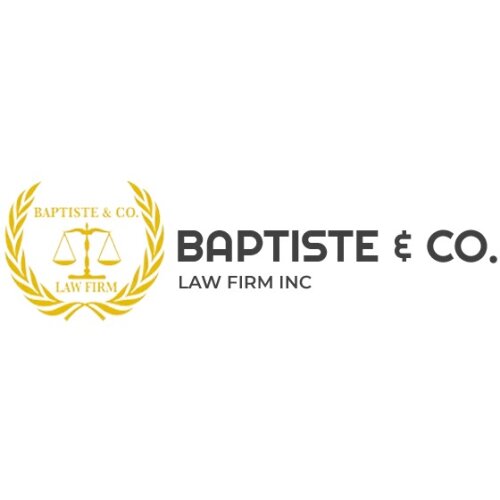Best Project Finance Lawyers in Saint Vincent and the Grenadines
Share your needs with us, get contacted by law firms.
Free. Takes 2 min.
Or refine your search by selecting a city:
List of the best lawyers in Saint Vincent and the Grenadines
About Project Finance Law in Saint Vincent and the Grenadines
Project finance refers to a method of raising capital for large infrastructure or industrial projects, typically through a special purpose vehicle, where the project's assets and future cash flows serve as collateral. In Saint Vincent and the Grenadines, project finance plays a critical role in supporting development in sectors such as tourism, energy, construction, and public infrastructure. The country's legal and regulatory framework has adapted to accommodate international standards, while offering unique advantages for investors and developers.
Why You May Need a Lawyer
Engaging a lawyer with expertise in project finance is essential to navigate the complex landscape of regulations, contracts, and risk management. Some common situations where legal help is necessary include:
- Structuring deals involving multiple investors or lenders
- Drafting and reviewing loan agreements and security documents
- Negotiating contracts with public authorities or private partners
- Managing regulatory approvals and compliance with local or international standards
- Advising on risk allocation and mitigation strategies
- Resolving disputes between project stakeholders
- Ensuring tax efficiency and meeting reporting obligations
Local Laws Overview
Several laws and regulations influence project finance transactions in Saint Vincent and the Grenadines. Key aspects to consider include:
- Corporate Law - Projects are often financed through special purpose companies. Registration and compliance requirements are set out under the Companies Act.
- Security Interests - Legal mechanisms exist to provide and perfect security interests over project assets, including moveable and immovable property.
- Banking and Financial Services Regulation - The Financial Services Authority (FSA) regulates local financial institutions and oversees compliance by both local and offshore entities.
- Foreign Investment - There are no onerous restrictions on foreign participation in most sectors but certain projects may require approval from the government or sector-specific regulators.
- Taxation - Tax considerations, such as withholding tax and VAT, are key factors in structuring financing arrangements. Some incentives are available for qualifying projects in priority sectors.
- Environmental and Planning Approvals - For large or environmentally sensitive projects, applicants must obtain permits and comply with environmental and planning legislation.
- Dispute Resolution - Disputes may be resolved through local courts or arbitration, with some contracts allowing for international arbitration under selected rules.
Given these interlocking legal requirements, early legal advice ensures project timelines and funding are not jeopardized by unforeseen regulatory or contractual issues.
Frequently Asked Questions
What is project finance and how does it differ from regular business loans?
Project finance is a funding structure where repayment depends primarily on the project's future cash flows, rather than the general assets or creditworthiness of the project sponsors. This differs from typical loans that rely on corporate balance sheets.
Can foreign investors participate in project finance in Saint Vincent and the Grenadines?
Yes, foreign investors are welcome, often with minimal restrictions. However, large projects may require government approval or compliance with sector-specific regulations.
What types of projects are commonly financed using this model?
Most commonly, large-scale infrastructure projects like hotels, resorts, energy facilities, and public utilities use project finance. It is also applied in transportation and commercial real estate.
What security interests can lenders take over project assets?
Lenders can secure their interests against land, buildings, equipment, shares of the project company, and contractual rights such as receivables and licenses. Proper registration is critical for enforceability.
What approvals or permits are needed to launch a project-financed development?
Depending on the sector, you may require business licenses, environmental impact assessments, planning approvals, and in some cases, special concessions from government authorities.
Are there tax incentives for project finance developments?
Yes, certain sectors, such as tourism and renewable energy, may qualify for tax holidays, import duty exemptions, and other incentives designed to encourage investment.
Is it necessary to establish a local company for a project?
Most project finance arrangements involve setting up a special purpose vehicle incorporated in Saint Vincent and the Grenadines to isolate assets and risks specific to the project.
How are disputes typically resolved?
Contracts often specify either litigation before local courts or international arbitration in case of disputes. The choice depends on the size and complexity of the project and the stakeholders' preferences.
What are the key risks in project finance transactions?
Risks include failure to achieve regulatory approvals, construction delays, cost overruns, inadequate revenue generation, and political or environmental changes. These must be carefully allocated and managed in the transaction documents.
How important is due diligence in project finance?
Comprehensive legal, financial, and technical due diligence is critical for identifying risks, confirming title and permits, validating cash flow projections, and ensuring the robustness of the project's structure.
Additional Resources
Several resources and organizations can help those seeking information or legal assistance in project finance:
- Financial Services Authority (FSA) - Regulator for non-bank financial services
- Investment Promotions Agency - Provides guidance and support to investors
- Chamber of Commerce & Industry - Supports local and foreign business initiatives
- Ministry of Finance, Economic Planning, and Information Technology - For information on taxation and incentives
- Experienced law firms and financial consultants specializing in project finance
Next Steps
If you are considering a project finance transaction in Saint Vincent and the Grenadines, it is advisable to consult with a qualified lawyer early in the process. Begin by:
- Defining your project’s objectives, scale, and partners
- Compiling key documents, such as business plans and feasibility studies
- Seeking an initial consultation with a lawyer who specializes in project finance and is familiar with local regulations
- Identifying any regulatory, licensing, or tax requirements specific to your project
- Developing a timeline and action plan, with input from legal and financial advisors
Proper legal guidance will help you navigate the legal environment, secure necessary approvals, and set your project on a path to successful financing and execution.
Lawzana helps you find the best lawyers and law firms in Saint Vincent and the Grenadines through a curated and pre-screened list of qualified legal professionals. Our platform offers rankings and detailed profiles of attorneys and law firms, allowing you to compare based on practice areas, including Project Finance, experience, and client feedback.
Each profile includes a description of the firm's areas of practice, client reviews, team members and partners, year of establishment, spoken languages, office locations, contact information, social media presence, and any published articles or resources. Most firms on our platform speak English and are experienced in both local and international legal matters.
Get a quote from top-rated law firms in Saint Vincent and the Grenadines — quickly, securely, and without unnecessary hassle.
Disclaimer:
The information provided on this page is for general informational purposes only and does not constitute legal advice. While we strive to ensure the accuracy and relevance of the content, legal information may change over time, and interpretations of the law can vary. You should always consult with a qualified legal professional for advice specific to your situation.
We disclaim all liability for actions taken or not taken based on the content of this page. If you believe any information is incorrect or outdated, please contact us, and we will review and update it where appropriate.
Browse project finance law firms by city in Saint Vincent and the Grenadines
Refine your search by selecting a city.











